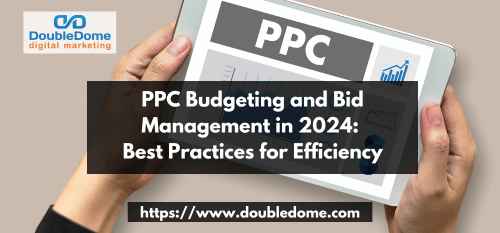By Jo Medico
Pay-Per-Click (PPC) advertising continues to be a central strategy for businesses aiming to increase their online visibility and drive targeted traffic to their websites. However, with the advancement of technology and changing consumer behaviors, the PPC advertising landscape is constantly changing. As we move deeper into 2024, it is important for marketers and advertisers to understand best practices for PPC budgeting and bid management to maximize efficiency and achieve optimal results.

Understanding the Importance of the PPC Budget
1. Set clear goals and objectives
Before starting the PPC budget allocation, it is necessary to set clear goals and objectives. Whether the goal is to increase website traffic, generate leads, or boost sales, having well-defined goals will guide budgeting decisions and ensure alignment with primary business goals.
2. Conduct thorough keyword research
Keyword research lays the foundation for successful PPC campaigns. By identifying high-performing keywords related to your business niche and target audience, you can optimize your budget allocation by focusing on terms with the highest potential to increase conversions.
3. Analyze historical data and performance metrics
Extracting information from previous campaign performance is key to improving PPC’s budget strategies. Analyze key metrics such as click-through rates (CTRs), conversion rates, and ROI to identify trends, areas for improvement, and allocate budgets more efficiently.
Application of Effective Bid Management Techniques
1. Use automated bidding strategies
In 2024, automation technologies are becoming increasingly sophisticated, offering advertisers a wealth of bid management options. Automated bidding strategies such as Target CPA (Cost Per Acquisition) and Maximize Conversions leverage machine learning algorithms to optimize bids in real-time, maximizing the likelihood of meeting campaign goals while meeting budget constraints.
2. Leverage audience targeting and segmentation
Personalization is key in modern PPC advertising. By segmenting your target audience based on demographics, interests and browsing behavior, you can tailor your offers to specific audience segments, ensuring that your ads are shown to the most relevant users, increasing the likelihood of conversion.
3. Implement ad scheduling
Timing plays a key role in the success of PPC campaigns. By analyzing when your target audience is most active and engaged, you can schedule your ads to appear at peak times, maximizing visibility and increasing the likelihood of clicks and conversions.
4. Monitoring competitor strategies
Monitoring your competitor’s PPC strategies can provide valuable insight into industry trends, keyword performance, and potential gaps in your own campaigns. By analyzing your competitors’ ad copy, landing pages, and bidding behaviors, you can improve your own PPC budget tactics to stay competitive in the market.
5. Embrace seasonal trends and events
Seasonal trends and events can significantly affect PPC performance. Whether it’s holidays, industry events, or peak shopping seasons, adjusting your PPC budget strategies to capitalize on seasonal trends can yield higher ROI and improve campaign effectiveness.
6. Apply negative keywords
Negative keywords play a critical role in improving PPC targeting and minimizing budget wastage. By identifying and excluding irrelevant search terms that are unlikely to lead to conversions, you can ensure that your ads are shown to the most qualified audience, thereby maximizing budget efficiency.
7. Test and Iterate Constantly
PPC advertising is an iterative process that requires constant testing and optimization. Experiment with different ad copy, landing page designs, and bidding strategies to determine what works best for your target audience. By embracing a culture of continuous improvement, you can improve your PPC budgeting approach and achieve better results over time.
8. Use ad extensions
Ad extensions offer additional opportunities to improve the visibility and relevance of your ads. From sitelinks and call extensions to structured snippets and site extensions, leveraging ad extensions can improve ad performance, increase click-through rates, and make your ads more attractive to potential customers.
9. Leverage remarketing campaigns
Remarketing allows you to re-engage users who have previously interacted with your website or shown interest in your products/services. By allocating a portion of your PPC budget to remarketing campaigns, you can target high-intent users, nurture leads, and increase conversions more effectively.
10. Optimize your landing pages
The effectiveness of PPC campaigns is not solely determined by the management of advertising and promotional copy. Landing pages play a critical role in converting clicks into leads or sales. Make sure your landing pages are optimized for relevance, clarity and user experience. A cohesive and engaging landing page that aligns with your advertising messages can significantly improve conversion rates and maximize the ROI of your PPC budget.
conclusion
As we navigate the dynamic landscape of PPC advertising in 2024, effective budgeting and bid management are paramount to achieving optimal results. By setting clear goals, conducting thorough research, and leveraging advanced bid management techniques, advertisers can maximize the effectiveness of their PPC campaigns, driving meaningful results and staying ahead of the competition.
Increase your online advertising with DoubleDome’s PPC Services! Increase targeted traffic and maximize ROI. Ready to upgrade your campaigns? Talk to us today about customized strategies!

